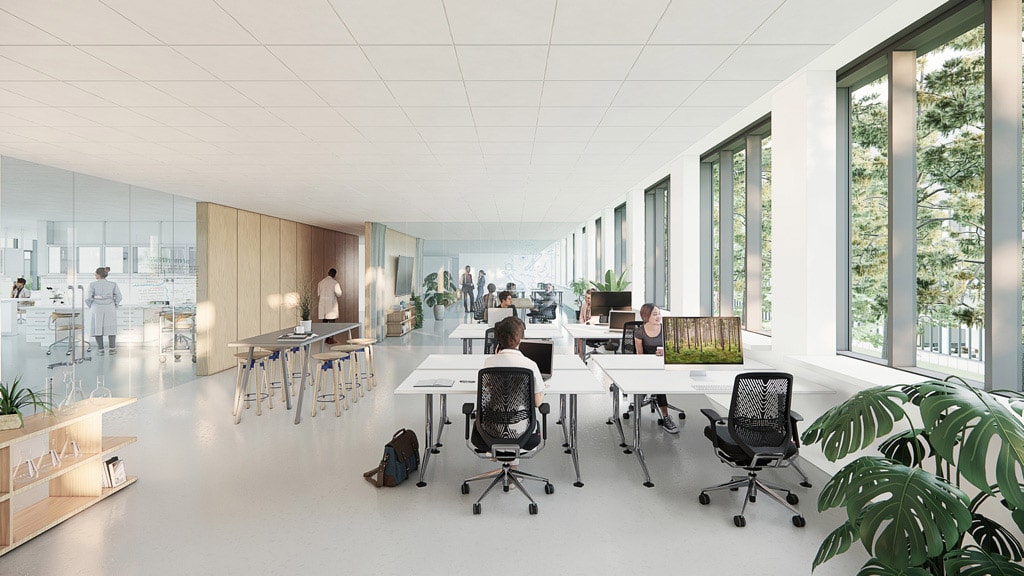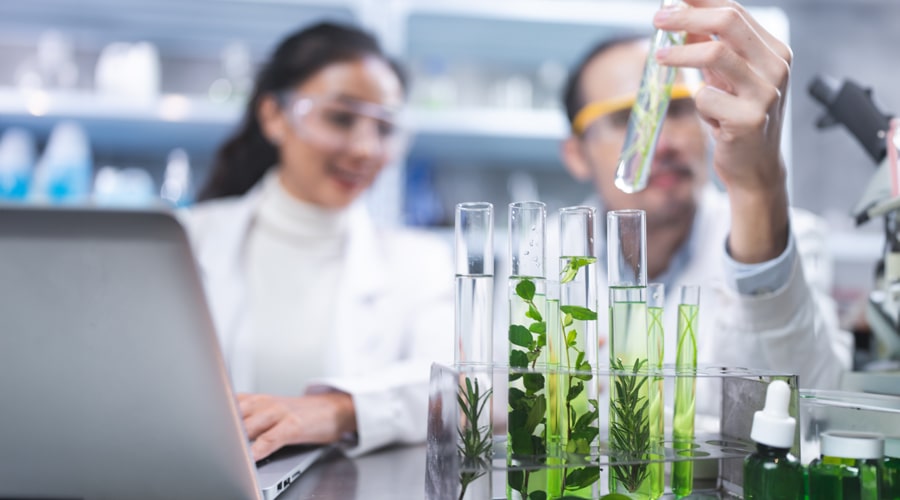In december, the Life Science Council issued 12 recommendations for the upcoming life science strategy. One of the recommendations, number 6, states: ‘There should be better frameworks for collaboration between research environments, the healthcare system, and businesses.’ That includes establishing more laboratory facilities, providing more assistance for business development, and increasing translational capacity.
Enormous potential in the life science industry
According to the Ministry of Industry, Business and Financial Affairs, exports in the life science industry have tripled from 2008 to 2022, with prospects for further growth. That indicates considerable growth potential.

The possibilities and visions for the life science industry are enormous. From the front row at DTU Science Park, we witness significant developments among our life science companies. In 2023 alone, 35% of the life science companies in the park expanded with additional laboratory square meters.
Steen Donner
CEO, DTU Science Park
At DTU Science Park, we focus on further optimizing the framework for the life science industry. The Science Park has massive growth plans over the coming years. In the spring of 2024, we will break ground on the expansion with an entirely new laboratory building.
“To stay at the forefront and ensure success for our companies, we are expanding our facilities with up to 12,000 newly built, state-of-the-art square meters of laboratories and offices. This is an important step to meet the existing laboratory needs and contribute to future-proofing the industry,” elaborates Steen Donner.
A green industry demands certified laboratories with reduced climate impact
The government’s current Strategy for Life Science for 2021-23 states that the life science industry has experienced massive growth in the last decade and is also leading in the green transition. The value added in the sector has increased by 135% from 2008-2018. At the same time, the industry has halved CO2 emissions since 1990: ‘The high growth rates of the life science industry and its relatively low environmental and resource pressure mean that CO2 emissions have halved since 1990, while value creation is close to tenfold,’ the strategy states.
“At DTU Science Park, we are building the laboratories of tomorrow. They will be DGNB gold-certified, meaning they will be built with a holistic approach to sustainability, focusing on the building’s environmental, economic, socio-cultural, functional, and technical quality,” says Steen Donner.”
What is DGNB?
- DGNB is a certification scheme that assesses and evaluates the sustainability of construction, buildings, and urban areas based on various criteria such as environmental, economic, social, and functional sustainability.
- The system promotes sustainability in construction by providing guidelines and standards for creating more environmentally friendly and resource-efficient buildings.
- The DGNB system is flexible and does not require specific solutions or materials, as buildings have different functions and requirements.

Tomorrow's laboratories at DTU Science Park
The groundbreaking for the ambitious construction project is planned for spring 2024. The objective is to have the laboratories ready for use by early 2026, thereby significantly achieving some of the government’s goals in the new strategy.
The new laboratory facilities are designed with development and progress in mind:
- The laboratories will be DGNB Gold-certified within various sustainability parameters to future-proof them and create the best environment for innovative and eco-friendly solutions.
- The establishment of up to 12,000 m2 of modern, high-tech laboratories and offices aims to meet the needs and demands of life science companies.
- Proximity to the Technical University of Denmark supports DTU and business community collaboration and ensures access to knowledge in a cohesive innovation environment.
A strong ecosystem for life science companies
According to the Life Science Council, the development of life science must continue. Various initiatives are needed, and one of them is a cohesive innovation environment. It should ensure coherence and accessible access to information between companies, healthcare, and research. Likewise, there is a focus area that Denmark should incubate and develop more viable startups within life science for the benefit of human and planetary health.
In addition to the new laboratories at DTU Science Park being DGNB-certified, they will be located close to the Technical University of Denmark (DTU), creating optimal conditions for solid collaboration. DTU Science Park is owned by DTU, creating unique opportunities for collaboration between DTU and the companies in DTU Science Park. In 2022, 55% of the companies in DTU Science Park collaborated with DTU. Companies in DTU Science Park have easier access to the best researchers at the university, and spinout companies from DTU often become part of DTU Science Park, for example, by obtaining office space or participating in growth programs.
About DTU Science Park
DTU Science Park is one of Europe’s most prominent and leading communities for deep tech companies. The science park creates optimal conditions for growth for startups and established companies by running recognized growth programs for startups, offering resources for business development, and providing modern laboratory and office facilities in Hørsholm and Lyngby.
